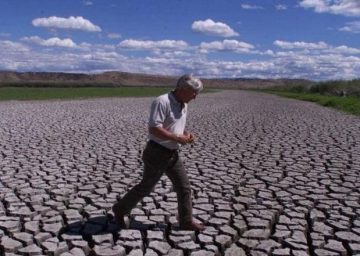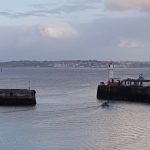Tag Archives: winter-run Chinook salmon

Editorial: State orders will harm salmon fisheries
During recent droughts, low river flows and warm water have proved to be a lethal combination for salmon and other fish in the Sacramento River and its tributaries. State waivers of water quality regulations in six of the past 10 years didn’t help beleaguered fisheries. January’s drenching rains dramatically improved river conditions across the state, raising hopes for winter run chinook salmon. But the storms also generated a cascade of complaints about water being “wasted.” In other words, storm runoff flowed through the Sacramento-San Joaquin Delta and into the Pacific Ocean. Gov. Gavin Newsom responded by suspending environmental regulations so more water is available this summer for Central Valley agriculture, a decision affirmed last week by the state Water Resources Control Board. >click to read< 09:56
These California and Oregon farmers lost water in 2001. Now they want to be paid.
 Northern California and Oregon farmers who lost irrigation water in 2001 for the sake of fish are plunging into a climactic courtroom battle for tens of millions of dollars in compensation. Years in the making, the trial set to start Monday in the U.S. Court of Federal Claims near the White House involves a lot of money, but that’s not all. For other Westerners, too, it can have broader implications, clarifying what the government may owe for water steered away from crops toward environmental protection. “It’s a civil rights case, at bottom,” farmers’ attorney Nancie Marzulla said in an interview. “It involves the protection of private property. We all expect the government to respect private property rights.” The same court ruled in 2001, for instance, that the federal government had taken water without paying compensation to California’s Tulare Lake Basin Water Storage District and others that had been deprived of water for the sake of the delta smelt and the winter-run chinook salmon. The judge later concluded the water districts were owed $13.9 million plus interest, and the case is still cited. Read the rest of the story here 15:10
Northern California and Oregon farmers who lost irrigation water in 2001 for the sake of fish are plunging into a climactic courtroom battle for tens of millions of dollars in compensation. Years in the making, the trial set to start Monday in the U.S. Court of Federal Claims near the White House involves a lot of money, but that’s not all. For other Westerners, too, it can have broader implications, clarifying what the government may owe for water steered away from crops toward environmental protection. “It’s a civil rights case, at bottom,” farmers’ attorney Nancie Marzulla said in an interview. “It involves the protection of private property. We all expect the government to respect private property rights.” The same court ruled in 2001, for instance, that the federal government had taken water without paying compensation to California’s Tulare Lake Basin Water Storage District and others that had been deprived of water for the sake of the delta smelt and the winter-run chinook salmon. The judge later concluded the water districts were owed $13.9 million plus interest, and the case is still cited. Read the rest of the story here 15:10
The sound of endangered salmon surviving
 Any day now, next time a storm sends a pulse of water down California’s Sacramento River, biologists at the Livingston Stone National Fish Hatchery will release this year’s batch of winter-run Chinook salmon. Of the 400,000 4-inch-long salmon smolts they release, 570 will be emitting a coded sound from a tiny electrical device implanted in their bellies. They’ll beep all the way down the river and, for those lucky enough to make it, out to sea. Winter-run Chinook salmon are critically endangered. They are particularly vulnerable in times of drought, when water levels are low and river temperatures high. With California now in the fourth year of a historic drought — and the state is still in a drought, despite short-term relief from recent storms — winter-run Chinook salmon are in an extremely perilous state. Read the article here 07:11
Any day now, next time a storm sends a pulse of water down California’s Sacramento River, biologists at the Livingston Stone National Fish Hatchery will release this year’s batch of winter-run Chinook salmon. Of the 400,000 4-inch-long salmon smolts they release, 570 will be emitting a coded sound from a tiny electrical device implanted in their bellies. They’ll beep all the way down the river and, for those lucky enough to make it, out to sea. Winter-run Chinook salmon are critically endangered. They are particularly vulnerable in times of drought, when water levels are low and river temperatures high. With California now in the fourth year of a historic drought — and the state is still in a drought, despite short-term relief from recent storms — winter-run Chinook salmon are in an extremely perilous state. Read the article here 07:11
Only 3 percent of juvenile salmon survived California drought in 2015
 Only 3 percent of the juveniles of an endangered salmon species survived the drought along the Sacramento River in 2015 despite extraordinary efforts by federal and state officials to save them, federal officials said Monday. It marked the second straight year that the vast majority of juvenile winter-run Chinook salmon were cooked to death on the Sacramento, according to data released by the National Marine Fisheries Service. In 2014, only 5 percent of the juveniles survived. Read the rest here 14:42
Only 3 percent of the juveniles of an endangered salmon species survived the drought along the Sacramento River in 2015 despite extraordinary efforts by federal and state officials to save them, federal officials said Monday. It marked the second straight year that the vast majority of juvenile winter-run Chinook salmon were cooked to death on the Sacramento, according to data released by the National Marine Fisheries Service. In 2014, only 5 percent of the juveniles survived. Read the rest here 14:42
Federal models for saving the species have proved faulty as Feds scramble to avoid another mass salmon die-off in the Sacramento River
 Larry Collins, a commercial fisherman operating out of Pier 45 in San Francisco, said that in the fight over water, the fishing industry – and wild fish – lack the political clout compared with municipal and agricultural interests.“I’ve been around a long time, and I’ve fought the battle for a long time, and I’ve watched the water stolen from the fish,” he said. “The fish are in tough shape because their water is growing almonds down in the valley. To me, it’s just outright theft of the people’s resource for the self-aggrandizement of a few, you know?” “You got money you can buy anything,” he added. “You can buy extinction.” Read the rest here 12:57
Larry Collins, a commercial fisherman operating out of Pier 45 in San Francisco, said that in the fight over water, the fishing industry – and wild fish – lack the political clout compared with municipal and agricultural interests.“I’ve been around a long time, and I’ve fought the battle for a long time, and I’ve watched the water stolen from the fish,” he said. “The fish are in tough shape because their water is growing almonds down in the valley. To me, it’s just outright theft of the people’s resource for the self-aggrandizement of a few, you know?” “You got money you can buy anything,” he added. “You can buy extinction.” Read the rest here 12:57
Imperiled fish add to California’s drought stress
Their populations dwindling, Northern California’s fish suddenly are taking a leading role in the drought-related drama gripping the state. State regulators, alarmed at declining numbers of winter-run Chinook salmon, acted in late May to temporarily curtail the flow of water from Lake Shasta, hoping to cool the giant reservoir’s waters and prevent another massive die-off of juvenile fish. The move means less water, at least for the time being, for farmers and urban Californians downstream. Read the rest here 11:06











































